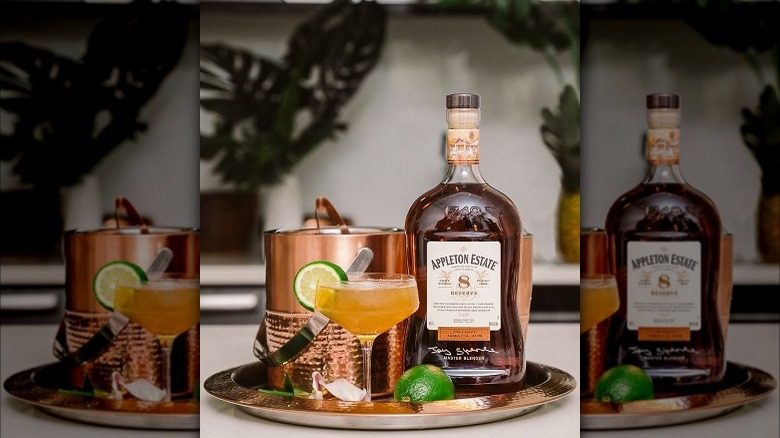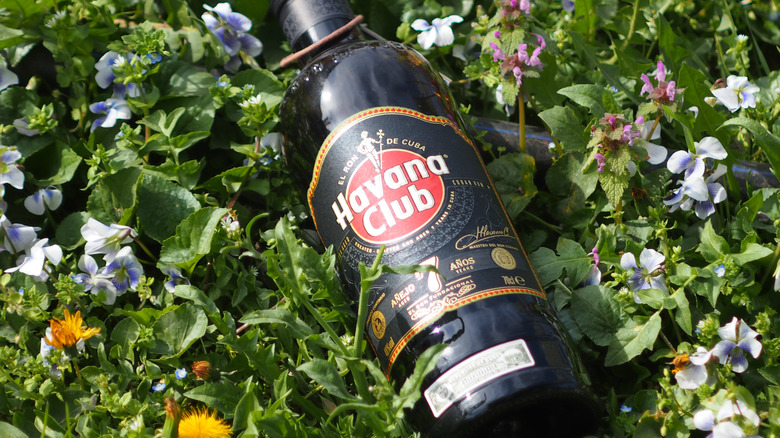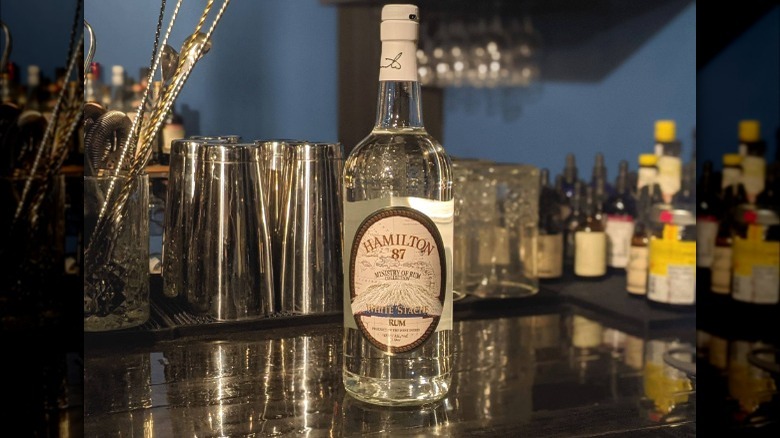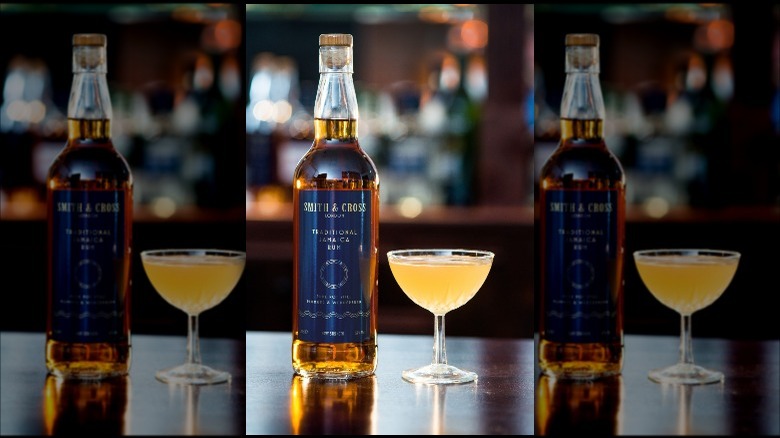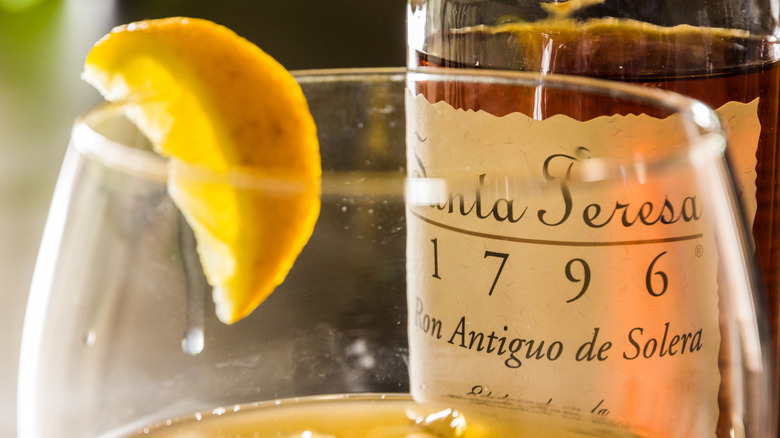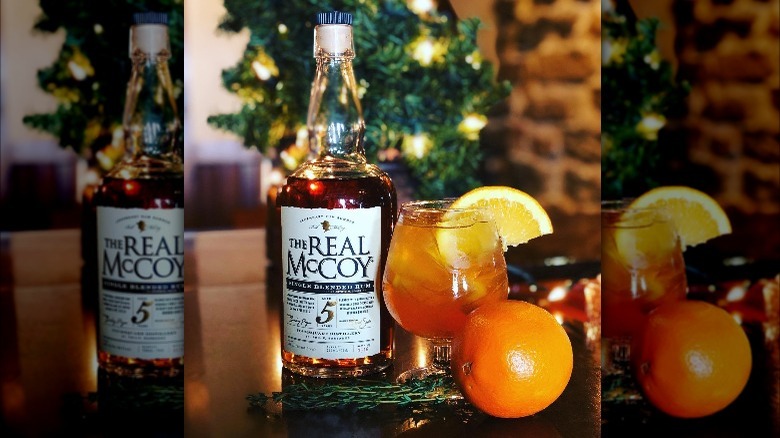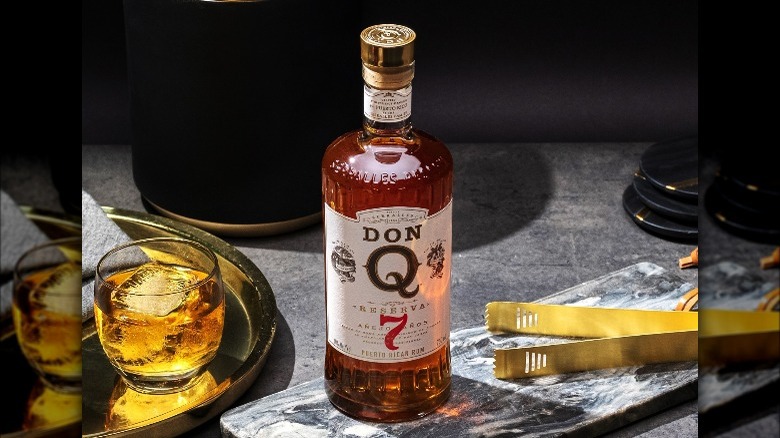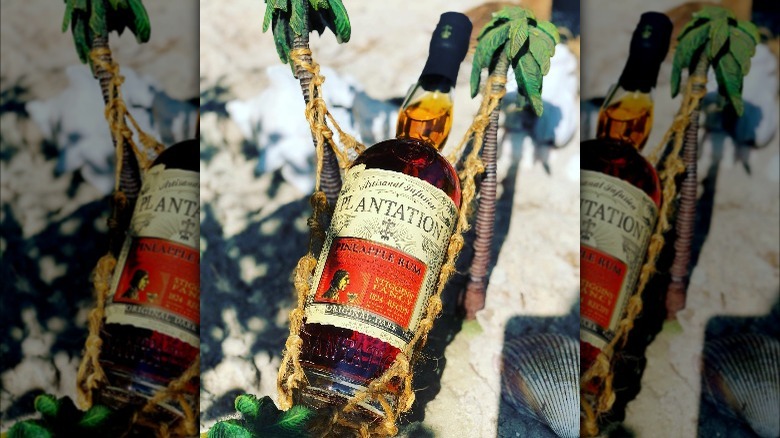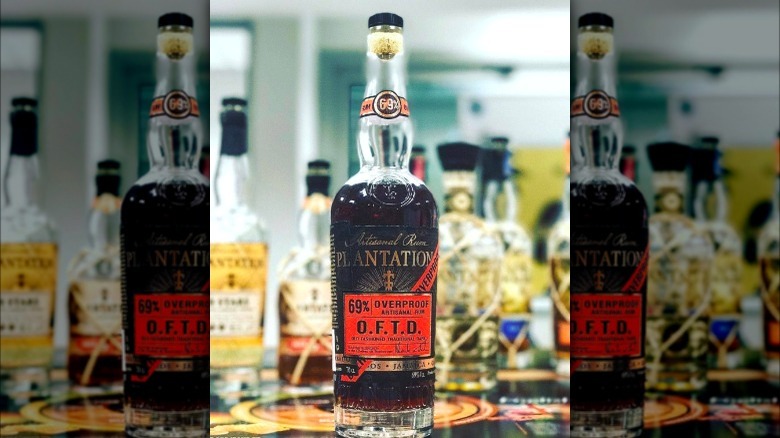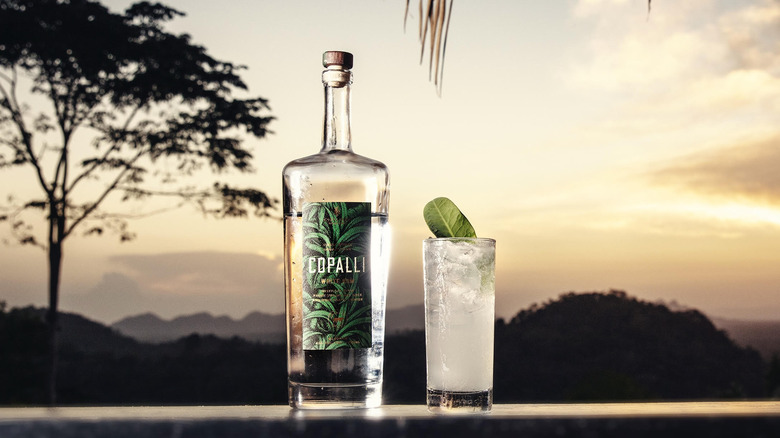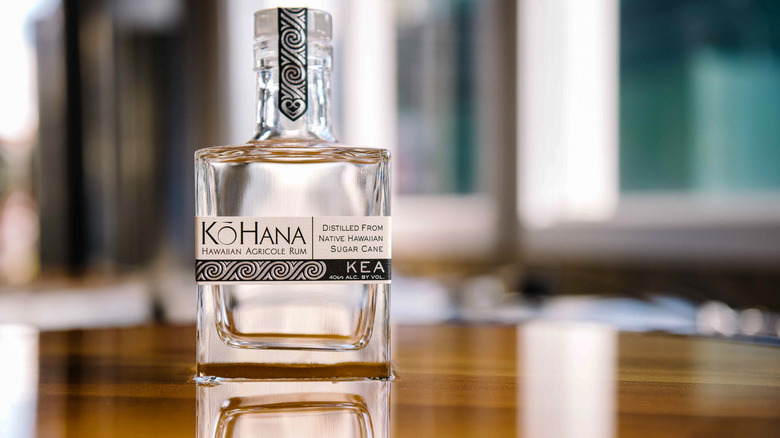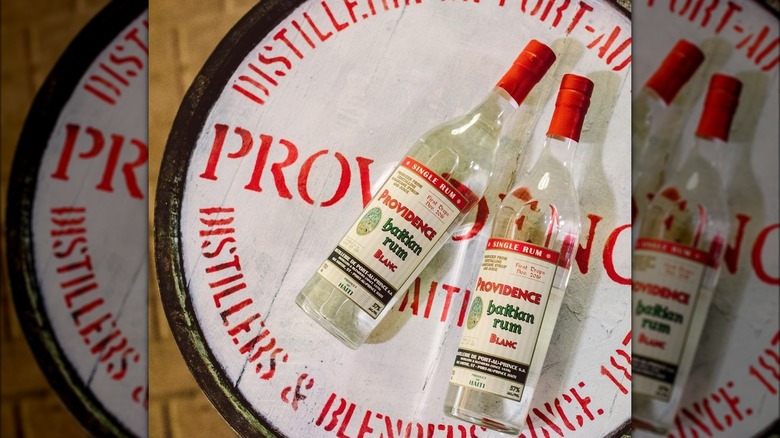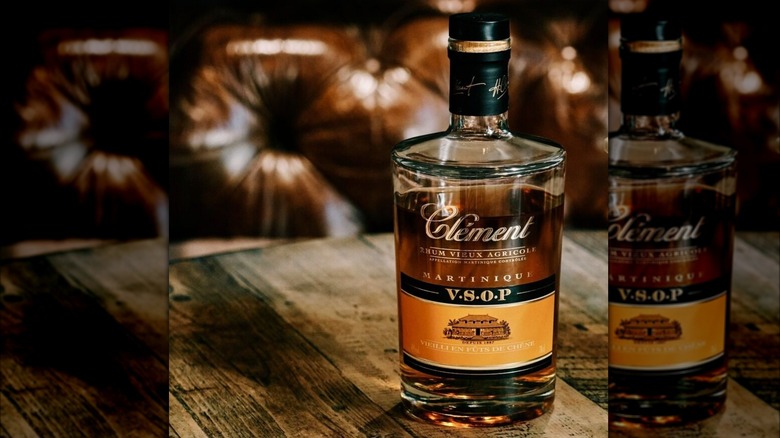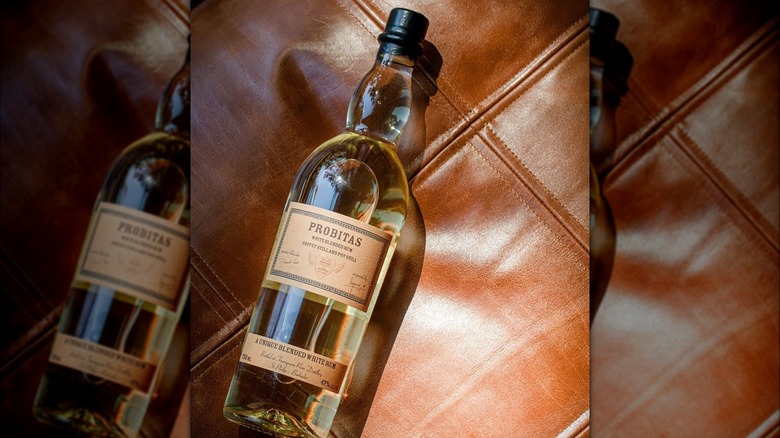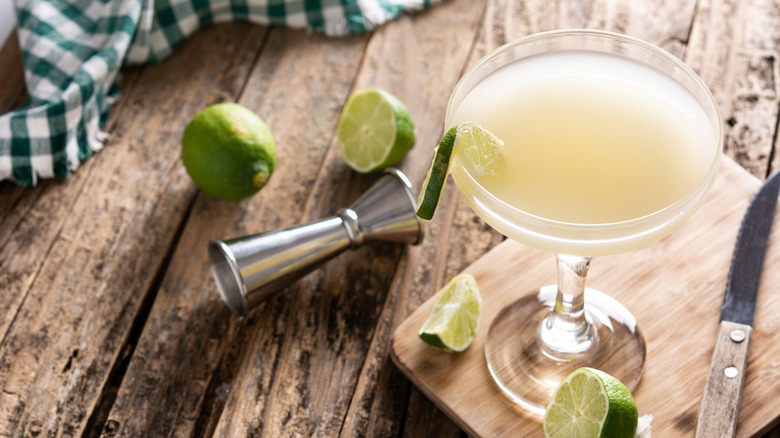15 Best Rums For Daiquiris, According To Industry Experts
The daiquiri is one of those cocktails that's been around for over a century. It hails from Cuba. It's been told that Jennings Cox, an American living in Cuba around the turn of the century, was running an iron mine near Santiago de Cuba. Cox discovered he was out of gin while entertaining some VIP guests, and the only liquor around was rum — a potentially true story that named the drink after the town in which the mine was located. That's right, Daiquiri. It remained a Cuban specialty until 1909, when Admiral Lucius Johnson of the U.S. Navy brought the drink back to the United States. Of course, once the daiquiri was here, it really took off, especially during WWII, when whiskey was hard to find due to war rationing.
Today, this drink can be as simple or as complex as the mixologist or home bartender wants it to be. But whether you choose a white or aged rum, the brand you use will definitely affect the final outcome. So, we reached out to 12 experts around the country for the top rums to use for an outstanding daiquiri.
Don Q Cristal
ABV: 40%
While several bartenders and rum experts believe that Cuban rum is the best choice for a daiquiri, the U.S. embargo makes it difficult to obtain. But that doesn't mean all hope is lost. Marie King, the bar manager at L.A.'s oldest surviving tiki bar, Tonga Hut, believes that Don Q Cristal is "solid and a relatively inexpensive" choice. Outside of Havana Club 3 Year, which is unavailable in the United States, the Don Q is "the closest thing to a traditional Cuban-style daiquiri."
Created 150 years ago when Don Juan Serrallés started making rum by using a copper pot still he'd imported from France, his technique has been passed down through six generations. Today, the Serrallés family continues the tradition that Don Juan started, making Don Q a first choice among many bartenders like King and Kevin Beary of Three Dots and a Dash.
"What makes a daiquiri so good is it's clean," says King, "and the Cristal has a little body to it (because they age it) and then they charcoal filter it, so it brings that body but with a clean essence that pairs with the brightness of the sugar and the brightness of the lime perfectly."
Appleton Estate 8 Year
ABV: 43%
Brynn Smith, a cocktail curator in Los Angeles who shakes up drinks at several bars around town and teaches a lot of virtual cocktail classes, feels that the daiquiri "is a drink that you can interchange with many different styles of rum." But Jamaican rums are Smith's first choice. While there are several out there to choose from, Smith prefers Appleton Estate 8 Year because "you get those funky notes, but it's also very approachable."
A Jamaican rum that comes from the Nassau Valley, Appleton Estate gets its unique flavor from the local sugar cane, which in turn gets its flavor from the unusual landscape. According to Appleton's website, the valley is a "karst" made up of "lime-stone hill formations, caves and streams," which naturally filters the rain into a clear water that feeds the sugar cane that is then pressed into rum. Appleton Estate rum had its first distillation in 1749 and has been producing ever since.
Havana Club 7
ABV: 40%
While finding a Cuban rum can be difficult, there is one out there that Robert Adamson, the prime minister of Strong Water Anaheim, says is his absolute go-to and should be in your home bar if you can get your hands on it: Havana Club 7 Años.
What makes the Havana Club so special? Like so many of the rums on this list, it's all about how the liquor is made and where the ingredients come from: The sugar cane, fertile soil, and tropical climate that can only be found in Cuba are what make this rum the liquor it is — as in, the Cuban terrior. Those three things are why the country is sometimes called the "isle of rum."
But, for Adamson, it's all about the flavor. He says he "likes the way the lime reacts to the dark rum. I really enjoy a bold expression. I know traditionally silver or white rum is meant for (the daiquiri), but I want a bully in the glass and that's how I see the Havana 7 year." He also uses key limes when they're in season, saying, "It's a pain to do, because the limes are so small, but holy guacamole is it good."
Hamilton White 'Stache
ABV: 43.5%
Named one of Imbibe Magazine's "25 Most Influential Cocktail Personalities," Jerry "Beachbum" Berry has written seven books on "vintage tropical drinks," as well as created a tiki app for the iPhone and iPad, so he knows a thing or two about rum. "The original daiquiri recipe calls for white Cuban rum, but, sadly, that's been contraband in the U.S. for decades now," says Berry. The cocktail expert explains there is one Cuban-style white rum though, that makes a great substitute: Hamilton White 'Stache.
Berry explains that while Cuban-style white rums max out at 80-proof, Hamilton White 'Stache clocks in at 87 proof, which is important because the classic cocktail was traditionally made with a higher-proof rum. At 80 proof, there's just too much water in the bottle, he says, diluting the rum flavor and dulling the taste of the cocktail: "It's the difference between serving one of the world's finest cocktails or merely serving spiked limeade."
That 87-proof comes from slowly and carefully diluting a high-proof, aged rum from Trinidad with filtered well water. That dilution process is what gives the rum its flavor and aroma and why Berry believes it's the only choice when making a daiquiri.
Smith & Cross
ABV: 57%
Starting at a sugar refinery near the London docks in 1788, Smith & Cross is another rum that's centuries old. According to the website, the refinery's partners started handling so much Jamaica rum, they had to build extensive underground cellars along the Thames to store it all. Made of a blend of Plummer and Wedderburn pot still distillates at the Hampden Distillery, it's a rum that was mentioned by a few experts as their first choice when shaking up a daiquiri.
Sean Cork, the self-proclaimed "in-house rum nerd" at the Cana Rum Bar in Los Angeles, says that when he makes a daiquiri, he prefers a Jamaican rum and specifically Smith & Cross. "For me this is a fantastic rum because it not only brings a wonderfully tropical fruity funk to the cocktail that marries perfectly with the lime and simple (syrup) while not getting buried, it also comes in at 57% alcohol by volume (considered navy strength rum), which gives your daiquiri a bit more punch."
Santa Teresa 1796
ABV: 40%
Like a lot of the experts we spoke to, Nick Jackson, the head bartender at New York's Rum House, had a hard time picking just one rum to make the perfect daiquiri. The Rum House has the classic daiquiri on its menu, along with several variations, and each drink uses a different rum because each cocktail has its own distinct flavor.
But Jackson says the "Santa Teresa 1796 is one of our top, favorite rums for all things here at The Rum House and makes a great 'dark' daiquiri with its profile of leather, vanilla, dark chocolate, and cinnamon. I could drink Santa Teresa 1796 daiquiris all day."
The 1796 on the Santa Teresa label is the date Hacienda Santa Teresa was created in the Aragua Valley in Venezuela. Originally founded as a plantation where coffee, sugar cane, and cacao was grown, the Vollmer family added rum shortly after German merchant Gustav Julius Vollmer met and married Panchita Rivas and took over the plantation. According to Santa Teresa, the crops grown on the plantation were the raw materials needed for a great rum: "There has always been sugar cane (at the hacienda) and since 1830 there has always been rum."
Real McCoy 5 Year
ABV: 40%
While some rums listed here are centuries old, a few are barely in their twenties. The Real McCoy is one of them. One theory for the famous saying hails from the 1840s when, according to The Guardian, Elijah McCoy had several inventions other companies copied. Since the knockoffs weren't as good, people only wanted "the real McCoy."
The saying got new life when, as explained in "The Real McCoy Documentary," rum runner Bill McCoy, filled his boat with rum and legally set up a "floating liquor store" just three miles off shore in international waters. Unlike other rum runners who would dilute their liquor with turpentine and wood alcohol, McCoy never did. Those contaminated liquors were known as "booze" or "hooch," while McCoy's quality spirits became known as "The Real McCoy."
The tradition of making an unsullied product continues today thanks to the partnership between documentarian and founder, Bailey Pryor, and master distiller, Richard Seale. Mike Treffehn, the bar manager at Portland's Rum Club, says his "absolute go-to" is the Real McCoy Aged 5 Year Premium Rum. Treffehn says, "It's complex enough to be rewarding as a sipper, but it really blossoms in a daiquiri. It's got enough to focus on, if you'd like to, but it isn't pushy about it."
Don Q Reserva 7
ABV: 40%
Kevin Beary, the beverage manager at Three Dots and a Dash in Chicago, is another believer that the best daiquiri is made with Cuban-style rums: "Classic daiquiris call for a 'Cuban-style' rum due to the origins of the daiquiri. This style of rum is broadly categorized as being produced from fermented molasses and distilled in a column still."
Since Cuban rums can be hard to find, Beary tells us that there are a few alternatives you can find that are produced in a similar way, in that the rum is distilled in a continuous still from fermented molasses. Don Q produces this style of rum. But, where some prefer Cristal, Beary believes the Reserva 7, a newer member of the Serrallés Collection, is the best choice.
The Reserva 7 is an aged Puerto Rican rum crafted from a blend of 7-year-old rums, making it the ideal choice for mixing vintage classics like the daiquiri, as well as inventing new ones.
Plantation Pineapple
ABV: 40%
The Plantation Rum brand was brought up multiple times in our conversations with rum experts. While not the oldest distillery on this list, it's not the youngest either. But there's something about Plantation Rum sourcing from different distilleries in Jamaica and Barbados that keeps bartenders and managers coming back. Alexandre Gabriel, the president and owner of Maison Ferrand, the parent company of Plantation Rum, loves "authentic products that express the personality of the land that grew them." If that doesn't describe rum, we don't know what does.
While touring the Caribbean searching for the best rums of the region, Gabriel wondered how his team could blend the varied distillations. He realized they could perfect the methods they used to make Cognac and, voila, Plantation Rum was born.
While Plantation Rum has several varieties under its label, Robert Adamson loves the Stiggins' Fancy Pineapple Rum. It's the base for Strong Water Anaheim's fall daiquiri, the peacock & the buffalo. "The drink has layers of pineapple, bourbon and spice," Adamson tell us. "The Plantation Pineapple has that taste and aroma of pineapple without being too sweet. It's an amazing and wonderful spirit that has no equal." Adamson explains the pineapple rum was supposed to be a one-off: "The reaction from the bar community was so overwhelming, they made it a staple in their production."
Plantation O.F.T.D.
ABV: 69%
Jason Doo, the owner of Wusong Road Tiki Bar in Cambridge, Massachusetts, is another who loves the Plantation Rum label. But, where Robert Adamson prefers the Pineapple, Doo says the O.F.T.D. is their "go-to." It's Plantation's take on the classic style of overproof rums. But this wasn't just Alexandre Gabriel's creation.
According to Plantation Rum, the owner of the brand's parent company worked with "six, grizzled old-salts, who knew which end of a rum bottle was which," to create the perfect blend and proof. What they ended up with is the O.F.T.D. or Old Fashioned Traditional Dark. The O.F.T.D. is a blend of Guyana, Jamaica, and Barbados rums, bottled at 69% alcohol.
Doo prefers the O.F.T.D. because of its "coffee, orange, plum jam, and truffle" flavors, which just scream fall to him and pair well with Massachusetts maple syrup and scotch. This Tiki bar owner says that while O.F.T.D. actually stands for Old Fashioned Traditional Dark, at Wusong Road, "We like to think it stands for Oh Fk That's Delicious!"
Copalli Rum
ABV: 44%
A white rum distilled in Belize is Rafael Ramirez's first choice when it comes to the daiquiri. The bar manager at The Rex and The Drift was skeptical when he first heard about Copalli White Rum because he "thought it was just another rhum agricole ... highly grassy, really green, and vegetal, but, once I tried that rum in the daiquiri itself, it just made me into a true believer."
Copalli prides itself on using just three ingredients for the rum: organic sugar cane, canopy water from the rainforest where the sugar cane farm is located, and yeast to ferment the freshly pressed sugar cane juice. The result is a smooth white rum that, according to Copalli, has tasting notes of strawberry, lime, and citrus zest.
"The grassy notes aren't as prevalent as in a traditional French rhum agricole-stye," says Ramirez. "It's still very green, but in a daiquiri, especially with a few drops of saline, it's pretty fantastic."
KoHana Kea
ABV: 40%
The Hawaiian rhum agricole called KoHana is distilled in Hawaii using heirloom sugar cane from the Hawaiian Islands. What makes KoHana so unique is that each of its rums comes from a different sugar cane varietal. According to Justin D'Olier, the sales manager for Kohana Rum, all 34 native Hawaiian heirloom sugar cane varietals used to make each of KoHana's rums are grown in Oahu. "Everything is about highlighting and expressing the beautiful flavors of native Hawaiian sugar cane," says D'Olier, even the name. Ko in Hawaiian means sugar cane and Hana means work, put them together and you get KoHana or The Work of the Cane.
Those flavors are why Marie King, the bar manager at Tonga Hut, uses the KoHana Kea when she wants to make a daiquiri for someone with a more advanced palate. Since agricole-style rums are made from sugar cane juice as opposed to molasses, King finds: "You get the terroir, you get the grassiness, you get what we call funk, and that KoHana is just funky enough, and yet still clean enough because of the way they make it, to make a perfect daiquiri sing. It brings out the brightness of the lime and the sugar."
Providence First Drops
ABV: 57%
For over two centuries, Haiti has been quietly producing a spirit made from sugar cane. But it's not rum, perse. It's known as clairin, a subset with a distinctly vegetal and herbaceous flavor thanks to the red cristalline cane growing organically throughout the country. That cane is hand-cut with machetes and pressed into a juice that naturally ferments without any yeast. At the end of this process, you have the beloved clairin, which is bottled and sold throughout the local villages. Originally only available in Haiti, this unique spirit has finally made its way to America and is being used by bartenders when they want to add a little more funk to their cocktails. Providence is one such rum.
While Providence may be the youngest rum on this list, only producing its first bottles in 2019, the distillery stands on the same spot where clairin has been made since the 19th century. What makes Providence stand out from the others isn't just where it comes from, but the fact that it uses both sugar cane juice and sugar cane syrup to create its quality rum.
As of this writing, there are just four bottles to the Providence name. However, Providence First Drops is the very first distillate that Thomas Bermudez, the general manager of San Francisco cocktail bar Last Rites, recommends. Bermudez says this is because it "makes a very luxurious daiquiri with [a] generous mouthfeel, lots of overripe fruit, and a hint of herbal complexity."
Rhum Clément VSOP
ABV: 40%
Carribean rum is a classic choice for the daiquiri because of its interesting flavors that stem from its terroir. While many rhum agricoles come from Jamaica, Clément is based in Martinique. But where other agricoles are usually distilled from molasses, Clément comes from sugar cane juice.
This novel idea was implemented by Clément's original owner, Homère Clément — aka the godfather of rhum agricole. In the wake of the devastating effects of Mount Pelée's 1902 eruption, Martinique's new mayor deputy at the time suggested making rum straight from the abundant sugar cane on the island. By removing the extra steps of turning the sugar cane into molasses first, Clément's streamlined process managed to help Martinique recover economically.
Clément has 10 rums on its docket, but it's the VSOP that Cristian Diaz, a bartender from Trader Sam's Enchanted Tiki Bar who's shared cocktail-making tips with us before, often reaches for when making daiquiris. Unlike the other Clément rums, Diaz tells us that the VSOP "has some amazing flavor notes, like coffee, chocolate, and toasted coconut." Aged for four years in ex-bourbon and French oak barrels, the VSOP is a rum that, as Diaz says, "when used in a daiquiri, those flavors really pop, and now your cocktail is an experience."
Probitas
ABV: 47%
Another white rum on the list, Probitas stands out because it's made from not one, not two, but three different rums. That's right, it's (gasp) a blend. But don't snub this rum just yet. This is coming from two of the biggest distributors in the rum world — Hampden Estate in Jamaica, and Foursquare Rum Distillery in Barbados — so it's bound to be good. But don't just take our word for it; Last Rites' general manager, Thomas Bermudez, tell us, "Probitas is a workhorse of a rum, and in a daiquiri, it comes across as subtly multifarious."
Created as an homage to white rums of the 20s and 30s, the three rums that make up Probitas come together to produce a unique flavor. "There's ripe tropical fruit, there's some darker undertones of light roast coffee, there's some dry green banana, there's limestone," Bermudez continues. You might think that variety of flavor would muddy the rum or make it a heavier spirit, but Bermudez says, "It really is light enough to meld with the delicate tartness of freshly squeezed lime but still with enough background flavor of its own to let you know that you are drinking rum and not vodka."
Methodology
When it comes to daiquiris the number of different rums available is endless. You could use a white rum, dark rum, rhum agricole, or we've even seen a few shaken up with spiced rum for a really interesting twist. And for each type of rum, there are numerous brands from which to choose. Bacardi may be an easy and obvious choice, but will it really make the best daiquiri? You want the liquor to shine, but it should also meld seamlessly with the lime juice and demerara syrup that make up this simple drink, which was adored by both Ernest Hemingway and President John F. Kennedy.
While we prefer a white or aged rum for the classic cocktail, we wanted to talk to the experts — those who make these drinks for a living, whether it be a bar that specializes in the sugar-based spirit, a fun tiki bar, or the local watering hole. So, we reached out to bartenders and rum experts from all over the country to find out which bottles they automatically pluck from the shelf any time a customer requests this delightful drink.


